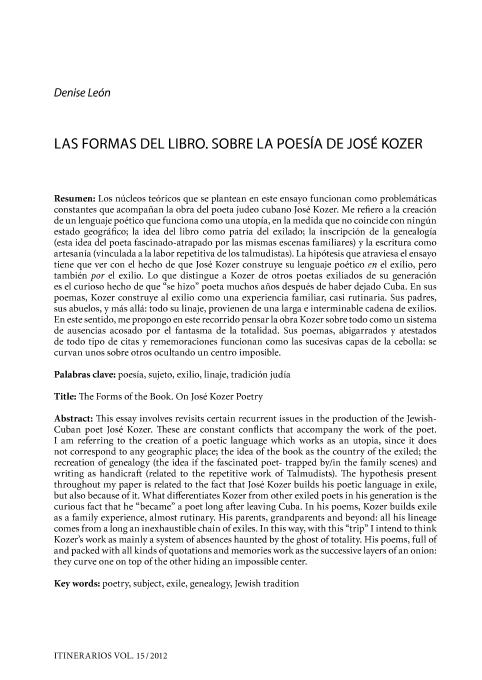Mostrar el registro sencillo del ítem
dc.contributor.author
León, Denise

dc.date.available
2018-08-29T22:09:38Z
dc.date.issued
2012-06
dc.identifier.citation
León, Denise; Las formas del libro: Sobre la poesía de José Kozer; Universidad de Varsovia. Instituto de Estudios Ibéricos e Iberoamericanos; Itinerarios; 15; 6-2012; 159-166
dc.identifier.issn
1507-7241
dc.identifier.uri
http://hdl.handle.net/11336/57624
dc.description.abstract
Los núcleos teóricos que se plantean en este ensayo funcionan como problemáticas constantes que acompañan la obra del poeta judeo cubano José Kozer. Me refiero a la creación de un lenguaje poético que funciona como una utopía, en la medida que no coincide con ningún estado geográfico; la idea del libro como patria del exilado; la inscripción de la genealogía (esta idea del poeta fascinado-atrapado por las mismas escenas familiares) y la escritura como artesanía (vinculada a la labor repetitiva de los talmudistas). La hipótesis que atraviesa el ensayo tiene que ver con el hecho de que José Kozer construye su lenguaje poético en el exilio, pero también por el exilio. Lo que distingue a Kozer de otros poetas exiliados de su generación es el curioso hecho de que “se hizo” poeta muchos años después de haber dejado Cuba. En sus poemas, Kozer construye al exilio como una experiencia familiar, casi rutinaria. Sus padres, sus abuelos, y más allá: todo su linaje, provienen de una larga e interminable cadena de exilios. En este sentido, me propongo en este recorrido pensar la obra Kozer sobre todo como un sistema de ausencias acosado por el fantasma de la totalidad. Sus poemas, abigarrados y atestados de todo tipo de citas y rememoraciones funcionan como las sucesivas capas de la cebolla: se curvan unos sobre otros ocultando un centro imposible.
dc.description.abstract
This essay involves revisits certain recurrent issues in the production of the Jewishban poet José Kozer. These are constant conflicts that accompany the work of the poet. not referring to the creation of a poetic language which works as an utopia, since it does t correspond to any geographic place; the idea of the book as the country of the exiled; the creation of genealogy (the idea if the fascinated poet- trapped by/in the family scenes) and iting as handicraft (related to the repetitive work of Talmudists). The hypothesis present toughout my paper is related to the fact that José Kozer builds his poetic language in exile, also because of it. What differentiates Kozer from other exiled poets in his generation is the rious fact that he “became” a poet long after leaving Cuba. In his poems, Kozer builds exile a family experience, almost rutinary. His parents, grandparents and beyond: all his lineage mes from a long an inexhaustible chain of exiles. In this way, with this “trip” I intend to think zer’s work as mainly a system of absences haunted by the ghost of totality. His poems, full of d packed with all kinds of quotations and memories work as the successive layers of an onion: y curve one on top of the other hiding an impossible center.
dc.format
application/pdf
dc.language.iso
spa
dc.publisher
Universidad de Varsovia. Instituto de Estudios Ibéricos e Iberoamericanos
dc.rights
info:eu-repo/semantics/openAccess
dc.rights.uri
https://creativecommons.org/licenses/by-nc-sa/2.5/ar/
dc.subject
Poesía
dc.subject
Exilio
dc.subject
Lenguaje
dc.subject
Artesanía
dc.subject.classification
Estudios Generales del Lenguaje

dc.subject.classification
Lengua y Literatura

dc.subject.classification
HUMANIDADES

dc.title
Las formas del libro: Sobre la poesía de José Kozer
dc.title
The Forms of the Book: On José Kozer Poetry
dc.type
info:eu-repo/semantics/article
dc.type
info:ar-repo/semantics/artículo
dc.type
info:eu-repo/semantics/publishedVersion
dc.date.updated
2018-07-11T15:09:41Z
dc.identifier.eissn
0103-815X
dc.journal.number
15
dc.journal.pagination
159-166
dc.journal.pais
Polonia

dc.journal.ciudad
Varsovia
dc.description.fil
Fil: León, Denise. Consejo Nacional de Investigaciones Científicas y Técnicas. Centro Científico Tecnológico Conicet - Tucumán. Instituto de Investigaciones sobre el Lenguaje y la Cultura. Universidad Nacional de Tucumán. Facultad de Filosofía y Letras. Cátedra de Literatura Argentina. Instituto de Investigaciones sobre el Lenguaje y la Cultura; Argentina
dc.journal.title
Itinerarios
dc.relation.alternativeid
info:eu-repo/semantics/altIdentifier/url/http://itinerarios.uw.edu.pl/las-formas-del-libro-sobre-la-poesia-de-jose-kozer/
Archivos asociados
